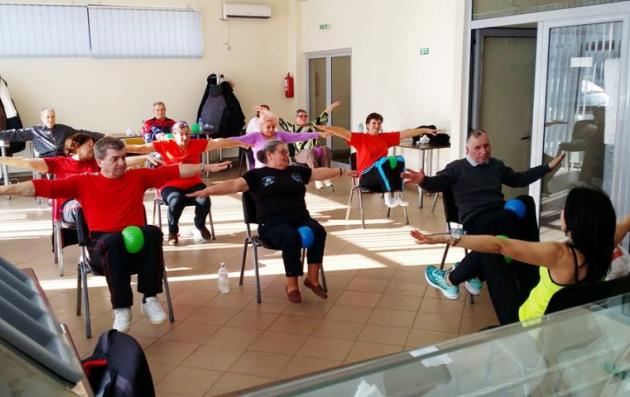Date of label : 02/06/2017

Summary
Confronted with social challenges, like increasing number of elderly, disabled people, and children whose parents work abroad, the City of Vaslui (RO) started a comprehensive process of rehabilitation of six of the former power plants that were heating the city neighbourhoods. These were transformed into six day care centres right in the heart of the biggest neighbourhoods of the city, serving directly a total of 300 elderly people, 15 young students and their families, and also offering a properly equipped auditorium open for any of the 14 000 students, NGOs or other cultural associations.
The solutions offered by the good practice
Hidden among city blocks of flats, the former neighbourhood power plants that were heating the communist flats, remained one by one without their main utility, since the centralised heating system has become technically outdated, thus, most users gave up on this service and chose individual heating systems. As a consequence of this phenomenon, at a local level, from a total of 27 heating power plants, only 6 are still working. The other 21 nonfunctional buildings, besides their unaesthetic aspect, were presenting a high risk of danger for health and safety of the citizens. Vaslui Municipality sought for solutions to address the identified problems, and in this regard, in collaboration with Vaslui Local Council, started a comprehensive process of rehabilitation and destination change for these locations.
Building on the sustainable and integrated approach
As poverty increases so does the risk of concentration of urban vulnerable and marginalised groups in deprived areas, which are characterised by social segregation, stigmatisation, reduced mobility, limited access to credit, housing deprivation and not only environmental degradation but reduced public spending on its prevention. Addressing vulnerable and marginalised groups has a direct impact on local municipal budgets, due for example to intense use of enabling support services and local benefits/subsidies allocated to alleviate poverty.
It is therefore no surprise that combating the related social/spatial segregation was identified by stakeholders at the city level as one of the key priorities that the Vaslui Municipality should target. The proposed strategies are contributing to the socio-economic inclusion of particular vulnerable and marginalised groups. The actions done will allow lasting and sustainable solutions for major societal challenges in the city in general through the establishment of innovative policy frameworks, action plans, pilot actions and follow up activities.
Based on a participatory approach
The growing social and economic inequalities are reflected in a reduced quality of urban life. To overcome these challenges the Municipality involved the targeted groups in participatory activities to tackle socio-economic exclusion for defining the best actions and plans to be developed. Development of the daycare centres and the activities performed within were a result of the multiple discussions had with the targeted beneficiaries. The scope was to assure a maximum level of satisfaction of the vulnerable/marginalised groups and integrate them into decision-making processes.
These actions are also a result of a broad participatory process undertaken within the development of the critical documents related to sustainable urban development: "Local Development Strategy Vaslui" (2009) and "Pole Metropolitan Development Strategy 2014-2020 Vaslui" (2014).
The process involved local government structures, local council and relevant local community stakeholders (NGOs and associations, businesses, public institutions, experts from various fields, ordinary citizens, vulnerable/marginalised groups).
The objective was to have a participatory approach in governance and planning, as concerns the exclusion of vulnerable/marginalised groups from social life and economic opportunities, and sustainable urban development. In this way, a common participatory methodology was created which can be successfully replicated in other cities and areas.
What difference has it made?
If we are talking about the Day centre for elderly „Buna Vestire”, the Day centre for elderly „Sfântul Nicolae”, The Club for retired persons, and the „Prietenia” club, almost 300 persons benefit directly from the investments done, the offered services vary from social and leisure activities, individual and group counselling, social counselling, medical and social assistance, moral and emotional support, and catering services. The cultural centre „Alexandra Nechita”, due to its purpose to offer for free an adequate space for cultural activities, we can say that it serves all of our 14 000 school students, NGOs and the local cultural associations. The day centre for schoolchildren „Bucuria” (Happiness) offers guidance for 15 children and their families.
Why should other European cities use it?
The integration of vulnerable and marginalised groups into social life and economic activities has a huge impact on the Vaslui Municipality. It generates costs in terms of direct loss of productivity and contributions to the public purse or through side effects such as increased social tensions, probability of poor health and socio-spatial segregations.
Vaslui Municipality is in a unique position in Romania to address this challenge with the new governance tools and strategies. It wants to enhance mechanisms to take decisions that are closest to most citizens. As the EU gradually moves out of the economic crisis it should be remembered that almost half of the EU's population lives in cities and that urban agglomerations are the main drivers for innovation, competitiveness and economic development across Europe.
Vaslui therefore has a key role to play in creating and supporting the right conditions for innovative actions in a Romanian context that lead to more and better social and economic integration of communities at risk of exclusion.
-
360_Vaslui_Gpsummary.pdf(PDF, 26Ko)
